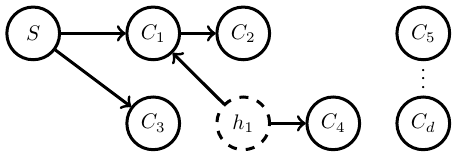Recovery of non-linear cause-effect relationships from linearly mixed neuroimaging data
Causal inference concerns the identification of cause-effect relationships between variables. However, often only linear combinations of variables constitute meaningful causal variables. For example, recovering the signal of a cortical source from electroencephalography requires a well-tuned combination of signals recorded at multiple electrodes. We recently introduced the MERLiN (Mixture Effect Recovery in Linear Networks) algorithm that is able to recover, from an observed linear mixture, a causal variable that is a linear effect of another given variable. Here we relax the assumption of this cause-effect relationship being linear and present an extended algorithm that can pick up non-linear cause-effect relationships. Thus, the main contribution is an algorithm (and ready to use code) that has broader applicability and allows for a richer model class. Furthermore, a comparative analysis indicates that the assumption of linear cause-effect relationships is not restrictive in analysing electroencephalographic data.
PDF Abstract
